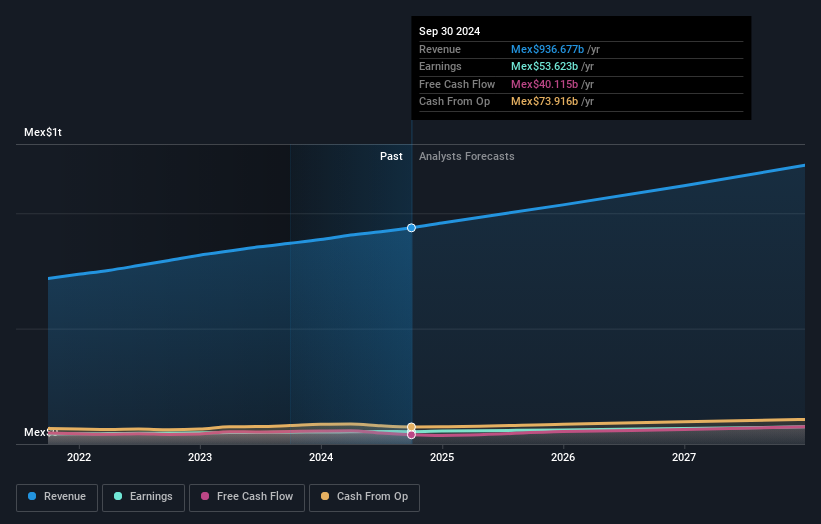- Mexico
- /
- Food and Staples Retail
- /
- BMV:WALMEX *
Public companies are Wal-Mart de México, S.A.B. de C.V.'s (BMV:WALMEX) biggest owners and were rewarded after market cap rose by Mex$34b last week

Key Insights
- The considerable ownership by public companies in Wal-Mart de México. de indicates that they collectively have a greater say in management and business strategy
- 71% of the company is held by a single shareholder (Walmart Inc.)
- Institutions own 12% of Wal-Mart de México. de
A look at the shareholders of Wal-Mart de México, S.A.B. de C.V. (BMV:WALMEX) can tell us which group is most powerful. And the group that holds the biggest piece of the pie are public companies with 71% ownership. That is, the group stands to benefit the most if the stock rises (or lose the most if there is a downturn).
Clearly, public companies benefitted the most after the company's market cap rose by Mex$34b last week.
Let's delve deeper into each type of owner of Wal-Mart de México. de, beginning with the chart below.
See our latest analysis for Wal-Mart de México. de

What Does The Institutional Ownership Tell Us About Wal-Mart de México. de?
Institutional investors commonly compare their own returns to the returns of a commonly followed index. So they generally do consider buying larger companies that are included in the relevant benchmark index.
We can see that Wal-Mart de México. de does have institutional investors; and they hold a good portion of the company's stock. This implies the analysts working for those institutions have looked at the stock and they like it. But just like anyone else, they could be wrong. It is not uncommon to see a big share price drop if two large institutional investors try to sell out of a stock at the same time. So it is worth checking the past earnings trajectory of Wal-Mart de México. de, (below). Of course, keep in mind that there are other factors to consider, too.

We note that hedge funds don't have a meaningful investment in Wal-Mart de México. de. Looking at our data, we can see that the largest shareholder is Walmart Inc. with 71% of shares outstanding. This implies that they have majority interest control of the future of the company. Meanwhile, the second and third largest shareholders, hold 2.3% and 1.2%, of the shares outstanding, respectively.
While studying institutional ownership for a company can add value to your research, it is also a good practice to research analyst recommendations to get a deeper understand of a stock's expected performance. There are a reasonable number of analysts covering the stock, so it might be useful to find out their aggregate view on the future.
Insider Ownership Of Wal-Mart de México. de
While the precise definition of an insider can be subjective, almost everyone considers board members to be insiders. The company management answer to the board and the latter should represent the interests of shareholders. Notably, sometimes top-level managers are on the board themselves.
Insider ownership is positive when it signals leadership are thinking like the true owners of the company. However, high insider ownership can also give immense power to a small group within the company. This can be negative in some circumstances.
Our data cannot confirm that board members are holding shares personally. It is unusual not to have at least some personal holdings by board members, so our data might be flawed. A good next step would be to check how much the CEO is paid.
General Public Ownership
With a 17% ownership, the general public, mostly comprising of individual investors, have some degree of sway over Wal-Mart de México. de. While this group can't necessarily call the shots, it can certainly have a real influence on how the company is run.
Public Company Ownership
Public companies currently own 71% of Wal-Mart de México. de stock. It's hard to say for sure but this suggests they have entwined business interests. This might be a strategic stake, so it's worth watching this space for changes in ownership.
Next Steps:
I find it very interesting to look at who exactly owns a company. But to truly gain insight, we need to consider other information, too. Case in point: We've spotted 1 warning sign for Wal-Mart de México. de you should be aware of.
Ultimately the future is most important. You can access this free report on analyst forecasts for the company.
NB: Figures in this article are calculated using data from the last twelve months, which refer to the 12-month period ending on the last date of the month the financial statement is dated. This may not be consistent with full year annual report figures.
Valuation is complex, but we're here to simplify it.
Discover if Wal-Mart de México. de might be undervalued or overvalued with our detailed analysis, featuring fair value estimates, potential risks, dividends, insider trades, and its financial condition.
Access Free AnalysisHave feedback on this article? Concerned about the content? Get in touch with us directly. Alternatively, email editorial-team (at) simplywallst.com.
This article by Simply Wall St is general in nature. We provide commentary based on historical data and analyst forecasts only using an unbiased methodology and our articles are not intended to be financial advice. It does not constitute a recommendation to buy or sell any stock, and does not take account of your objectives, or your financial situation. We aim to bring you long-term focused analysis driven by fundamental data. Note that our analysis may not factor in the latest price-sensitive company announcements or qualitative material. Simply Wall St has no position in any stocks mentioned.
About BMV:WALMEX *
Wal-Mart de México. de
Owns and operates self-service stores in Mexico and Central America.
Excellent balance sheet and good value.
Market Insights
Community Narratives



